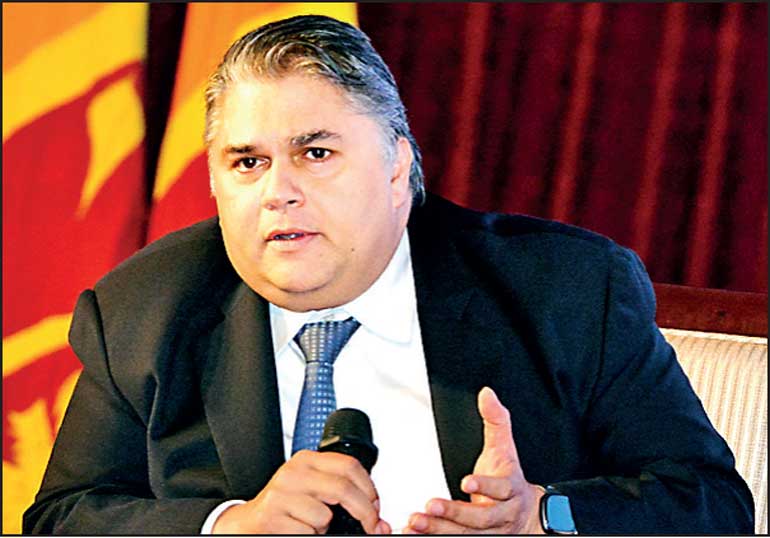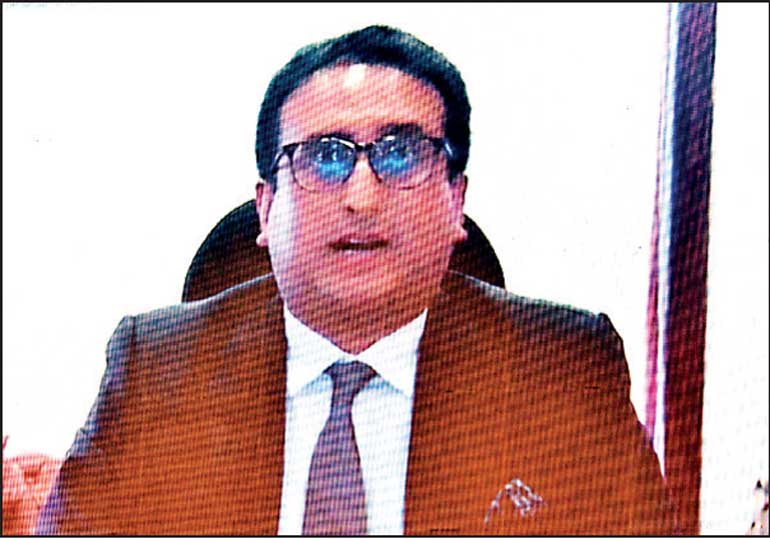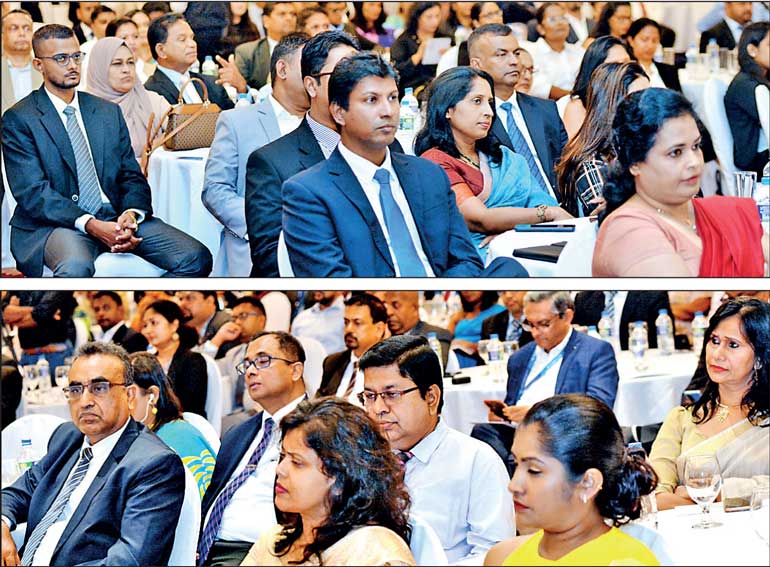Monday Feb 23, 2026
Monday Feb 23, 2026
Friday, 26 July 2024 00:00 - - {{hitsCtrl.values.hits}}

Galle Face Hotel Chairman and CEO Sanjeev Gardiner

CG Corp Global and CG Hospitality Holdings MD and CEO Rahul Chaudhary (Virtual)

 By Michelle Therese Alles
By Michelle Therese Alles
The Human Capital Summit 2024, held last week at Temple Trees, brought together industry leaders, policymakers, and experts to discuss the future of workforce development in Sri Lanka.
With a focus on the five key pillars of Tourism, Information Technology, Finance Services, Startups, and Public Sector Capacity, the summit featured insightful presentations, engaging panel discussions, and actionable recommendations.
Today we focus on the insights shares by experts on the future of tourism sector of Sri Lanka.
Highlighting the critical role that tourism plays in driving economic growth, cultural exchange, and sustainable development, the Tourism Pillar hosted distinguished speakers from various sectors of the tourism industry, with the discussions revolving around innovative strategies to enhance the sector’s resilience to future shocks.
In his keynote address, Pacific Asia Travel Association (PATA) Chairman Peter Semone emphasised that Sri Lanka possesses the right qualities to develop its tourism sector, highlighting the nation’s warm and friendly culture as a key asset. He also stressed the necessity of providing quality education and training programmes, emphasising that a well-educated workforce is fundamental to delivering exceptional tourism experiences. “Developing core competency accreditation and certification schemes,” Semone stated, “ensures that tourism professionals meet the highest standards of expertise.”
Semone pointed out the importance of leveraging technology to create more personalised and immersive travel experiences, and the potential of artificial intelligence and data in understanding consumer behaviour and tailoring services accordingly. “In a world increasingly driven by digital interactions, the tourism industry must adopt advanced technologies to meet the evolving expectations of travellers,” he said. Semone also underscored the importance of guiding tourism quality and safety standards, believing that these areas are vital for attracting and retaining tourists, thereby boosting the sector’s growth.
The mantra
One of the key messages in his speech was the mantra, “A good place to live is a good place to visit.” Semone stressed that ensuring a high quality of life for residents translates into a positive experience for visitors, creating a sustainable and thriving tourism destination. By focusing on these strategic areas, Semone believes that the public sector can significantly contribute to the development of human capital in the tourism industry, ultimately driving economic growth and enhancing the appeal of Sri Lanka as a destination.
Asian Development Bank (ADB) Sri Lanka Resident Mission Country Operations Head Cholpon Mambetova provided a thought-provoking analysis of the current state and potential of the tourism sector, particularly emphasising the role of women and youth. She highlighted that women constitute only 10% of the tourism workforce, predominantly in hotel roles. “Tourism,” she asserted, “can engage more meaningfully with local communities, offering diverse opportunities beyond traditional roles.” Mambetova pointed out that youth often lack awareness of the opportunities available in the tourism industry. “Raising awareness among young people about the myriad career paths in tourism is crucial,” she said. She also called for a stronger collaboration between the government and the hospitality sector to ensure that the workforce is equipped with the right skills and approach to promote tourism effectively. “The government and hospitality sector must work hand-in-hand to develop and promote the right skill sets,” she emphasised. Furthermore, Mambetova assured that the ADB is committed to assisting with skills development programmes to enhance the sector. “ADB will support the development of skills to uplift the tourism sector,” she pledged. She stressed the importance of quality-assured vocational training, particularly for women and people with disabilities. “Ensuring accessible and high-quality vocational training for women and people with disabilities is vital for an inclusive workforce,” she stated. The demand for quality human resources in tourism is undeniable, according to Mambetova. “There is a clear demand for skilled and quality human resources,” she remarked. She advocated for a pragmatic, long-term approach to integrating these elements into a coherent strategy. “We need a pragmatic, long-term-focused approach to combine all these ingredients into a workable solution and start implementing the activities,” she concluded.
Challenges and recovery of tourism
Jetwing Symphony PLC Chairman Hiran Cooray delivered a poignant address on the challenges and recovery of the tourism sector. He began by reflecting on the hard times the industry faced in the recent past, emphasising the significant impact it had on the workforce. “We lost some of our best talents—chefs, engineers, and various other skilled workers from the hotel industry,” he remarked. He noted that many of these professionals left in frustration and are not fulfilling their potential in the countries they relocated to.
Despite these challenges, Cooray noted a marked improvement in the tourism sector this year compared to the recent past. “There has been a noticeable recovery in 2024, which is a positive sign after the difficult period we endured,” he said. This resurgence offers hope for the future, yet it also underscores the need to rebuild and invest in local talent.
Hiran Cooray emphasised the need for inclusive development programs, particularly for women over 40 and people with disabilities. His remarks stressed the importance of continued investment in human capital to sustain and grow the tourism sector. “Rebuilding our workforce and providing opportunities is essential for our industry’s future,” he concluded.
The insightful speech of MJF Holdings Co-Chair and Resplendent Ceylon Founder Malik J. Fernando, underscored the critical issue of human capital retention in Sri Lanka’s tourism sector. Highlighting the emigration of skilled workers, he pointed out a concerning trend, “Sri Lanka is exporting its USP, which are its people, and since they are emigrating, the chances of them coming back are less.” He also stressed that the unique experiences provided by long-serving staff cannot be replicated by newcomers.
Fernando also underscored the need for improved marketing to attract high-value tourists. “If you promote the destination well, you attract the right kind of tourists who are willing to pay the right kind of money,” he stated. “Then you can pay your staff more, which will encourage them to remain with you.” He emphasised that effective destination marketing is crucial, noting, “We need to get our marketing of this destination right because we are not getting the right kind of tourists. Marketing is very closely linked to a successful human resources product,” Fernando asserted, illustrating how attracting the right tourists can enhance employee retention and overall service quality. His remarks underscored the interconnected nature of marketing and human resource strategies in building a resilient and sustainable tourism sector in Sri Lanka.
Retaining and developing talent
Hilton Sri Lanka Area General Manager Manesh Fernando provided a candid assessment of the challenges and strategies in retaining and developing talent within the hospitality sector. He acknowledged the difficulties in retaining staff during turbulent times, stating, “We can’t force people to remain here; sometimes we need to let them go and allow them experience new work environments. This approach has tangible benefits for Sri Lanka as many expatriates remit significant amounts of money back home, particularly from countries like the Maldives, benefiting not just the economy but also their families,” he noted.
Fernando elaborated on Hilton’s proactive strategy to manage talent, highlighting the international opportunities provided to their employees. “As an international hotel chain, we sent almost 60 front liners on 5-year visas to Japan. This initiative serves a dual purpose: motivating employees to utilise the Hilton system to gain global experience, and ensuring that a percentage of these individuals return to their homeland as more empowered individuals,” he shared.
He emphasised the significant role of the Sri Lankan diaspora in revitalising the tourism industry post-crisis. Reflecting on the need for resilience and forward planning, he added, “We should look at how we survive today so that we can live tomorrow.” To address current challenges, Fernando stressed the importance of productivity and innovation, adapting to new realities, and leveraging the contributions of the diaspora to ensure the sustainable growth of Sri Lanka’s tourism sector.
International perspective
CG Corp Global and CG Hospitality Holdings MD and CEO Rahul Chaudhary shared his insights from an international perspective, focusing on the strategic steps taken through their global partnerships and investments, and highlighting the importance of these collaborations in enhancing the company’s footprint and operational excellence worldwide. Despite the challenges, Chaudhary expressed unwavering confidence in Sri Lanka, emphasising their commitment as ardent investors. He pointed out that while Sri Lanka has faced its share of ups and downs over the years, its fundamentals have remained very strong. “The country’s core strengths and potential are undeniable, which is why we remain optimistic and committed to our investments here,” Chaudhary concluded.
In his candid message, former President of the Maldives Mohamed Nasheed offered a unique perspective on fostering growth in the tourism industry. Drawing from the Maldivian experience he advocated for minimal governmental interference to allow the industry to flourish independently. Nasheed emphasised the importance of human mobility, highlighting the significant financial benefits of remittances. “No, don’t bring back your people,” he urged, pointing out that Sri Lankans sent back $ 7 billion to the country in 2020, even before the pandemic, noting that the amount has since doubled. He stressed that organised emigration should not be obstructed, as it allows individuals to earn more and potentially return with enriched experiences.
Mohamed Nasheed also underscored the importance of maintaining and advertising cultural and natural assets. He suggested using Sri Lanka’s cricket team as ambassadors and integrating sustainability into tea farming. “Don’t destroy the natural beauty of the island…that’s what people are coming to see and enjoy,” he advised, highlighting the country’s natural beauty as a key attraction for tourists. He praised Sri Lanka’s historical commitment to education, noting the establishment of its first university in 1921 and the Sri Lanka Institute of Tourism and Hotel Management in 1964, despite the cessation of English medium education in 1956. Mohamed Nasheed concluded by acknowledging Sri Lanka’s excellence in producing skilled individuals and encouraged the continuation of this practice. His remarks underscored the strategic vision of leveraging human capital, promoting sustainability, and enhancing the country’s global image to drive growth in the tourism sector.
Leveraging Sri Lanka’s unique strengths
John Keells Leisure Global Alliances and Partnerships Senior VP and John Keells Holdings Head of Corporate Affairs Dileep Mudadeniya emphasised the critical need to address labour shortages and skill gaps in Sri Lanka’s tourism industry. He highlighted the competitive nature of global tourism, noting that many countries are actively working to increase their tourist arrivals. “Labour shortage is going to be a critical issue,” he stressed, underscoring the urgency of equipping the workforce with the necessary skills. To this end, he announced the launch of the Cinnamon Academy in September, which aims to train individuals and provide them with valuable opportunities within the sector.
Mudadeniya also pointed out the need to review and adapt immigration laws to better support the industry and further emphasised the importance of reputation management for Sri Lanka, warning that lapses in service quality could have significant repercussions.
In conclusion, the Tourism Pillar underscored the critical importance of investing in and developing human capital across this key economic sector. The insights shared by industry leaders and policymakers highlighted the interconnectedness of education, skill development, marketing, and strategic partnerships in driving the country’s growth and resilience. The need for inclusive development programmes, targeted vocational training, and innovative approaches to workforce retention emerged as pivotal themes.
Speakers like Peter Semone, Cholpon Mambetova, Hiran Cooray, Malik J. Fernando, Manesh Fernando, Rahul Chaudhary, Mohamed Nasheed, and Dileep Mudadeniya provided valuable perspectives on leveraging Sri Lanka’s unique strengths, addressing current challenges, and creating sustainable opportunities for future generations. Their contributions reinforced the view that a well-trained and motivated workforce is essential for the tourism sector’s recovery and long-term success.
As Sri Lanka navigates its path forward, the collaborative efforts of the public and private sectors, along with the support of international partners, will be crucial in building a resilient and thriving economy. By focusing on the strategic areas of skill development, marketing, and inclusive growth, Sri Lanka can unlock its full potential, ensuring that it remains a premier destination for tourists and a beacon of human capital excellence. The Human Capital Summit 2024 has set the stage for these transformative efforts, offering a roadmap for sustainable development and prosperity.